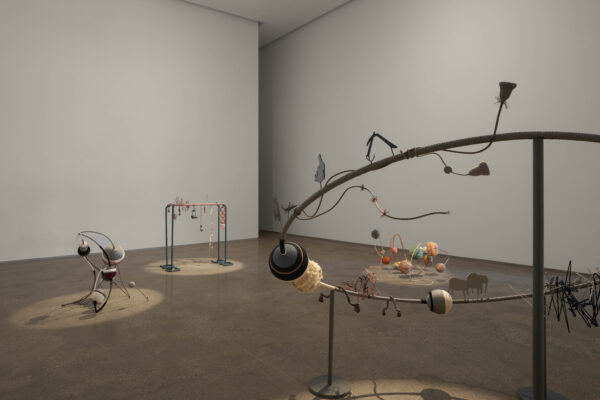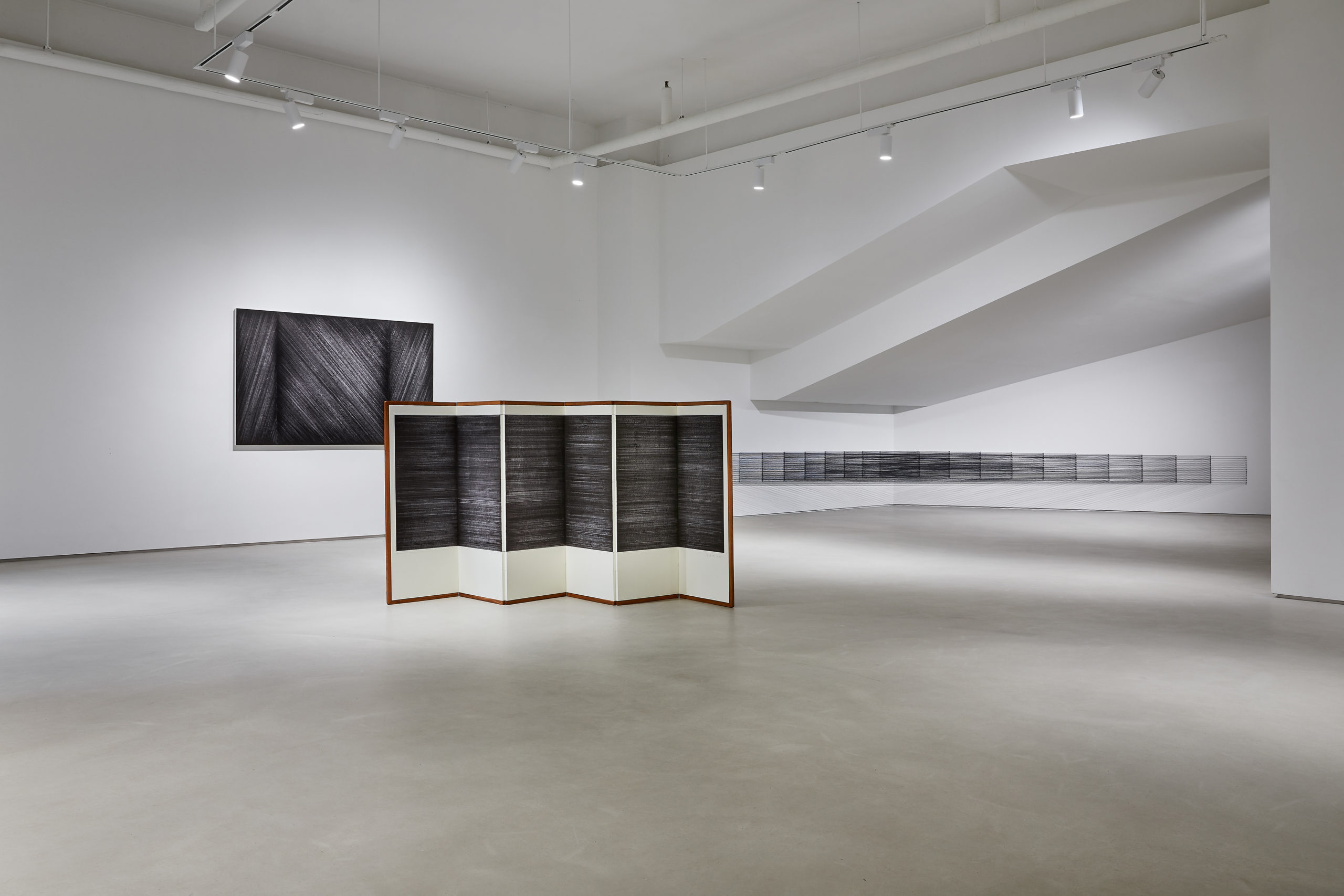중국 동시대미술 3부작 : 상흔을 넘어
| [CULTURAL ISSUE] BUSAN MUSEUM OF ART
2020.9.25 – 2021.2.28.
쑹둥, 주진스, 류웨이

1980년대부터 본격화된 중국의 개혁과 개방 정책은 고도성장을 이끌어 왔지만, 한편으로는 자본주의 그늘을 피할 수 없었다. 민주화 요구가 분출되었으며, 양극화 현상은 심화 되었다. 중국 현대미술 1세대들이 체제나 국가에 대한 비판적 시선을 견지했다면, 최근 중국의 동시대 미술은 개방의 여파로 다양한 경향의 작업을 선보이고 있다. 이번 전시는 중국개혁과 개방 1세대라고 할 수 있는 주진스(朱金石), 90년대 저항적인 예술 운동의 중심이었던 아파트먼트 아트의 쑹둥(宋冬), 인터미디어 감각을 보여주는 류웨이(刘韡)를 통해 중국 현대미술의 새로운 경향을 소개한다. 특히 중국 동시대 미술의 특정 시기나 예술의 형식을 보여주는 기획에서 벗어나 중국 현대사에서 지워지지 않는 80년대 말 6월 4일 사건을 기점으로, 그 이후의 변화과정을 압축적으로 보여주기 위해 노력하였다.

중국은 1960년대 후반 마오쩌둥(毛澤東, 1893–1976)이 주도한 사회주의 체제가 들어서면서 1970년대 후반까지 암흑의 시대라고 일컫는 ‘문화대혁명’ 시대를 보냈다. 모든 분야에서 극심한 억압과 탄압이 행해졌고 당시 예술은 사회주의를 선동하고 체제 유지를 위한 도구였다. 하지만 중국은 마오쩌둥 체제 말기인 1976년, 마오쩌둥의 죽음을 맞이하고, 문화대혁명 기간 동안 마오쩌둥의 권력을 장악했던 4인방(장칭 江靑, 왕훙원 王洪文, 장춘차오 張春橋, 야오원위안 姚文元)이 몰락한다. 그리고 민생을 안정시키기 위해 자본주의의 일부를 차용하는 정책이 힘을 얻으면서 덩샤오핑(鄧小平)은 새로운 권력으로 떠오른다. 그의 정책은 빠른 속도로 중국의 현대화를 이끌어낸다. 특히 1980년대 초반부터 1990년대 말까지 약 10년간 중국의 미술 분야는 서양에서 150년 동안 이루어진 변화를 한꺼번에 받아들이면서 빠른 변화를 거치게 된다. 문화대혁명 이후, 그리고 6월 4일 사건을 직간접적으로 경험한 중국 예술가들에게 중국 근현대미술은 역사에 대한 경험이자 투쟁의 결과였다.
1980년대는 서양의 현대미술을 배우고 익히는 시기였다면 1990년대 이후 중국 작가들은 새로운 관점에서 현대미술을 해석하기 시작했다. 1970년대 말 사건을 기점으로 중국현대예술의 변화를 개략적으로 살펴보면 후 문화 혁명기(1979-1984), 85 미술 운동시기(1985-1989), 그리고 1990년대로 거칠게 구분할 수 있다. 후문화혁명 시기에는 형식미와 추상미를 추구하는 경향과 문화혁명 이후의 상처를 드러내는 ‘상흔 미술’과 ‘향토 회화’ 등의 사실주의 회화가 주류를 이루었다. 또한 중국 아방가르드의 시초라고 하는 ‘성성화회(星星畵會)’ 등 정규 미술교육을 받지 않은 자발적 예술가들이 출현한다. 전형적인 중국식 전위예술 운동이라고 불리는 85 미술 운동은 중국 현대미술에서 혁명적인 변화를 주도하였다. 이후 1990년대에는 정치적 팝아트, 냉소적 사실주의 등 현재 세계미술 시장에 가장 많이 소개되었던 작품들이 커다란 흐름을 형성하였다. 그뿐만 아니라 정부의 통제를 벗어나 자유로운 작품활동을 추구했던 ‘아파트먼트 아트’도 이 시기에 출현하였다.

이번 전시에서는 앞서 언급한 시기별 변화를 압축적으로 보여주는 핵심적인 작가를 선정하였다. 중국 현대미술사에서 최초로 아방가르드 정신을 구현했던 ‘성성미전(星星美展)’ 참여작가 주진스, 1990년대 정부 통제에 저항했던 아파트먼트 아트의 핵심작가 쑹둥, 그리고 포스트-센스-센스빌리티(Post-Sense Sensibility) 그룹에서 활동한 류웨이, 주진스는 1954년생, 쑹둥은 1966년생, 그리고 류웨이는 1972년생이다. 이들 모두는 중국개방개혁의 현실을 경험하면서도 개인적인 시차를 가지고 있다. 이들의 작품을 통해 중국 동시대 미술의 흐름을 상상할 수 있을 것이다. 그리고 그 흐름은 중국현대사의 깊은 ‘상처’ 혹은 ‘상흔’을 담고 있다. 이번 전시의 타이틀을 ‘상흔을 넘어’로 설정한 이유도 바로 여기에 있다. 민주주의를 위해 저항했던 주진스의 작업에는 자유에 대한 깊은 상흔이 내재되어있으며, 정부 통제가 극심했던 90년대에 개인적인 공간인 아파트에서 예술적 활동을 이어갔던 쑹둥의 작업에는 중국 현대사와 개인사가 극적으로 조우한다. 그리고 류웨이는 재개발을 해 매일 철거가 이루어지고 있는 베이징의 도시화 과정을 보며 이를 주제로 다양한 작업을 보여줌으로써 중국 동시대 미술의 새로운 경향을 대변하고 있다.

이번 전시는 ‘중국 동시대 미술의 3부작(Trilogy of Contemporary Art in China)’이라는 타이틀을 설정했다. 자본에 대한 개방이 한국에 비해 늦었던 중국은 매우 압축된 시간에 유입의 과정이 진행되었다. ‘성성화회’의 주진스에서부터 ‘포스트-센스 센스빌리티’의 류웨이에 이르기까지 출생연도로 따지면 20년이 채 되지 않지만, 그들이 가지고 있는 감각의 층위는 매우 다양하다. 이는 급변했던 중국의 사회상황을 그대로 반영하고 있으며 민주화, 자본의 유입, 그리고 그로 인한 도시화라는 사회적 전환의 상처를 드러내고 있다. 가령 주진스의 작업은 서구의 동시대미술과 중국적인 요소들을 지속적으로 병치시킴과 동시에 제도권 예술의 한계를 넘어서려는 시도는 끝임 없이 ‘자유’를 추구하는 미적 자기 결정권에 대한 실천이다. 또한 쑹둥의 작품에 새겨진 소비사회의 이데올로기는 자본이 가지고 있는 어두운 속성을 그대로 반영하고 있다. 마지막으로 자본이 가장 추상적으로 집적되어 있는 ‘도시’라는 경험은 이전의 도시와는 전혀 다른 새로운 문명이다. 류웨이는 도시와 문명에 대한 암울한 ‘모뉴멘타’를 은유적으로 보여준다. 이번 전시 타이틀 ‘상흔을 넘어’는 3명의 작가가 중국 개혁과 개방을 겪으면서 드러나는 자유의 상흔, 자본의 상흔, 도시의 상흔을 제시하고 있으며, 이러한 3가지 개념은 중국 동시대 미술을 이해하는 가장 핵심적인 키워드이다.
부산시립미술관
부산시 해운대구 APEC로 58
051 744 2602











